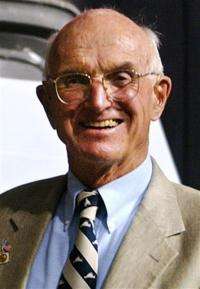US organ transplant pioneer Murray dies at 93 (Update)

Dr. Joseph Murray, who won the Nobel Prize for performing the first-ever successful organ transplant, died late Monday in Boston at the age of 93, his family said.
After suffering a stroke Thursday, Murray died at Boston's Brigham and Women's Hospital, where he conducted the landmark kidney transplant in 1954.
"We are grateful that we had the opportunity to have a wonderful Thanksgiving together as a family—four generations of Murrays—and we will cherish the many happy memories we have of this remarkable man," his son Rick Murray said.
Born on April 1, 1919 in Milford, Massachusetts, Murray traced his interest in the emerging science of transplants to the three years he spent on the surgical ward of an army hospital in Pennsylvania during World War II.
There surgeons would often treat severely burned soldiers with skin grafts from cadavers as a temporary measure.
"The slow rejection of the foreign skin grafts fascinated me. How could the host distinguish another person's skin from his own?" Murray would later write in an autobiographical essay published by the Nobel committee.
Murray learned that the chief plastic surgeon, Colonel James Brown, had earlier carried out a skin graft on identical twins in which the recipient's body had accepted the foreign tissue rather than instinctively attacking it.
"This was the impetus to my study of organ transplantation," Murray wrote.
The prospect of transplanting organs from one living patient to another was controversial from the outset, with critics viewing it as a violation of nature that endangered both the donor and the recipient.
But the public attitude to the procedure changed following Murray's historic operation on December 23, 1954, when he transplanted a kidney from Ronald Herrick to identical twin brother Richard, extending his life by eight years.
In those eight years, Herrick married his post-operative nurse, had two children and toasted his brother for "the extra drink," the Boston Globe reported. Ronald Herrick only passed away in 2010.
In the 1960s Murray helped to develop the drug Imuran, which suppressed the immune system to allow patients to accept transplants from unrelated donors.
He won the Nobel Prize in Medicine in 1990, sharing the honor with E. Donnall Thomas, who pioneered bone marrow transplants.
Their discoveries have been used to cure or provide a decent life for tens of thousands of severely ill patients.
Murray later focused on plastic surgery, specifically the repair of facial defects in children. He led Brigham's plastic surgery department for almost four decades and the division at Children's Hospital Medical Center from 1972 to 1985, said the Globe.
"My life as a surgeon-scientist, combining humanity and science, has been fantastically rewarding," Murray wrote in the Nobel autobiography.
"In our daily patients we witness human nature in the raw—fear, despair, courage, understanding, hope, resignation, heroism. If alert, we can detect new problems to solve, new paths to investigate."
Murray is survived by his wife, three sons, three daughters and 18 grandchildren, the Globe said.
(c) 2012 AFP


















